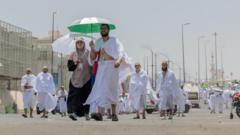Saudi officials stress the importance of following safety guidelines while pilgrims are warned against illegal entry, facing hefty fines and bans.
Saudi Arabia's holy city of Mecca has welcomed over 1.4 million Muslims for the Hajj pilgrimage, an event fraught with risks due to extreme heat conditions. In response to the 1,300 fatalities recorded last year, mainly associated with intense temperatures, the Saudi authorities have implemented a series of preventive measures aimed at enhancing the pilgrims' safety.
These measures include the planting of thousands of trees and installation of hundreds of cooling units throughout the city. This year, temperatures are expected to soar as high as 44°C (111°F), significantly affecting the health and well-being of the participants. Moreover, a ban has been placed on children under 12 from undertaking the pilgrimage, alongside strict penalties of up to $5,000 (£3,685) for those entering Mecca without official permissions.
As of the recent updates, over 269,000 individuals have been stopped from entering the holy city, highlighting the enforcement of these regulations. Last year's high mortality rate was partially attributed to a large number of unregistered pilgrims who lacked access to essential amenities like air-conditioned accommodations. Many individuals seeking to partake in the Hajj cannot afford official packages, which can range from $4,000 to $20,000, leading them to seek entry via tourist or visitor visas.
The Hajj, which is one of the five Pillars of Islam and a mandatory pilgrimage for all able Muslims, holds immense spiritual significance. This year, upon commencement, male pilgrims donned the traditional white garments of Ihram while females wore modest attire. Pilgrims have participated in rituals including circling the Kaaba and the symbolic walk between the hills of Safa and Marwa.
In efforts to counteract the heat, Saudi health officials have outlined guidelines that encourage pilgrims to stay out of direct sunlight during peak hours, utilize umbrellas, and maintain hydration. Additionally, the shaded areas surrounding key sites have expanded by 50,000 square meters (about 12 acres), complemented by more than 400 newly installed cooling units.
Innovative infrastructure such as rubberized, cooled roads will also help in lowering ground temperatures. The Grand Mosque in Mecca boasts the world's largest cooling system to safeguard the health of those attending the pilgrimage. Modern technologies, including artificial intelligence integrated with drone operations, will further assist in crowd management, ensuring a safer environment for all pilgrims.
Reflecting on past incidents, notable tragedies within the Hajj, such as the 2015 stampede in Mina which resulted in over 2,300 deaths, have reinforced the urgency for enhanced safety measures during one of the world's largest religious gatherings.
Saudi Arabia's holy city of Mecca has welcomed over 1.4 million Muslims for the Hajj pilgrimage, an event fraught with risks due to extreme heat conditions. In response to the 1,300 fatalities recorded last year, mainly associated with intense temperatures, the Saudi authorities have implemented a series of preventive measures aimed at enhancing the pilgrims' safety.
These measures include the planting of thousands of trees and installation of hundreds of cooling units throughout the city. This year, temperatures are expected to soar as high as 44°C (111°F), significantly affecting the health and well-being of the participants. Moreover, a ban has been placed on children under 12 from undertaking the pilgrimage, alongside strict penalties of up to $5,000 (£3,685) for those entering Mecca without official permissions.
As of the recent updates, over 269,000 individuals have been stopped from entering the holy city, highlighting the enforcement of these regulations. Last year's high mortality rate was partially attributed to a large number of unregistered pilgrims who lacked access to essential amenities like air-conditioned accommodations. Many individuals seeking to partake in the Hajj cannot afford official packages, which can range from $4,000 to $20,000, leading them to seek entry via tourist or visitor visas.
The Hajj, which is one of the five Pillars of Islam and a mandatory pilgrimage for all able Muslims, holds immense spiritual significance. This year, upon commencement, male pilgrims donned the traditional white garments of Ihram while females wore modest attire. Pilgrims have participated in rituals including circling the Kaaba and the symbolic walk between the hills of Safa and Marwa.
In efforts to counteract the heat, Saudi health officials have outlined guidelines that encourage pilgrims to stay out of direct sunlight during peak hours, utilize umbrellas, and maintain hydration. Additionally, the shaded areas surrounding key sites have expanded by 50,000 square meters (about 12 acres), complemented by more than 400 newly installed cooling units.
Innovative infrastructure such as rubberized, cooled roads will also help in lowering ground temperatures. The Grand Mosque in Mecca boasts the world's largest cooling system to safeguard the health of those attending the pilgrimage. Modern technologies, including artificial intelligence integrated with drone operations, will further assist in crowd management, ensuring a safer environment for all pilgrims.
Reflecting on past incidents, notable tragedies within the Hajj, such as the 2015 stampede in Mina which resulted in over 2,300 deaths, have reinforced the urgency for enhanced safety measures during one of the world's largest religious gatherings.




















